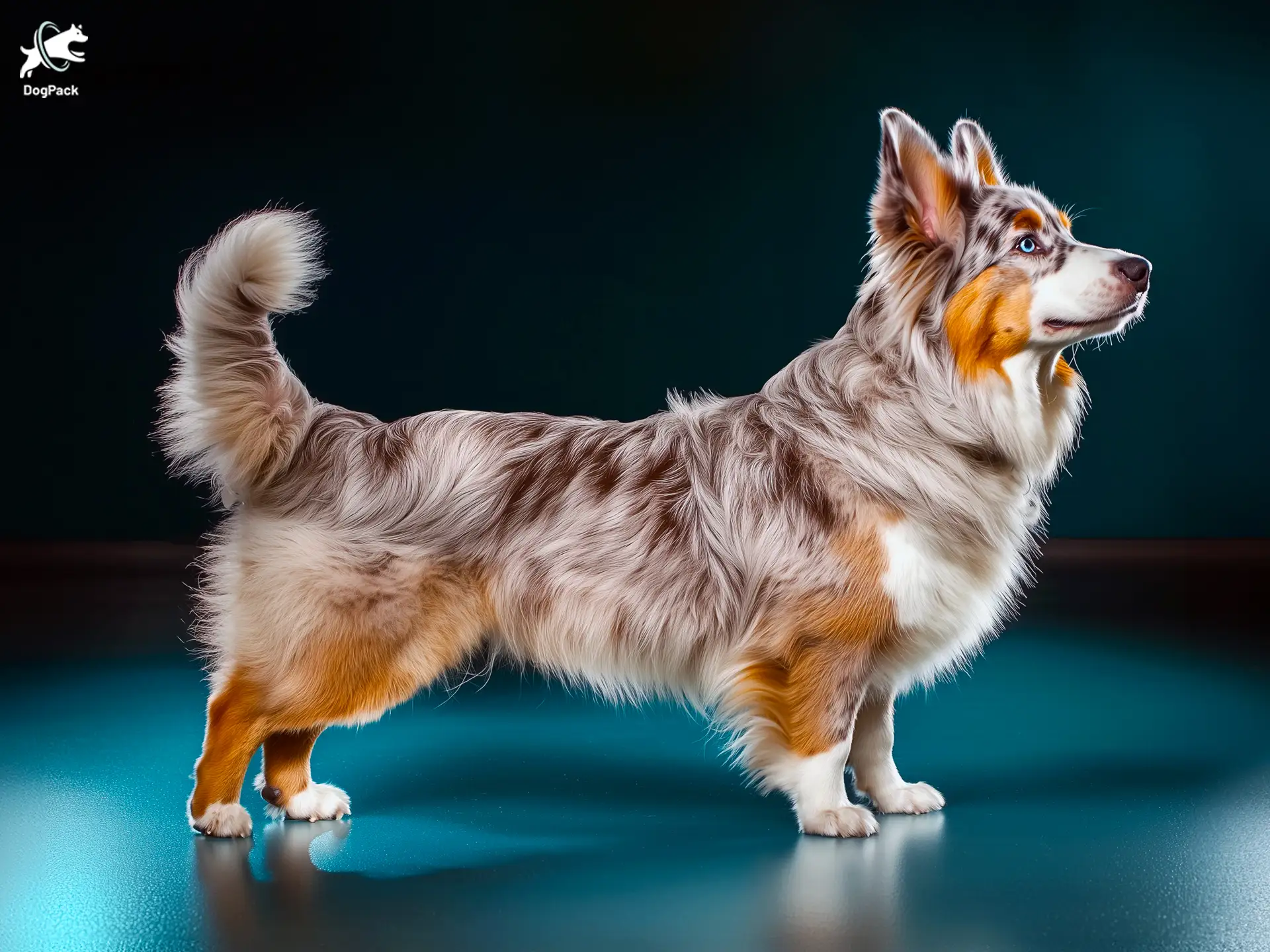Anatolian Shepherd Dog Breed Info & Overview
The Auggie is a charming hybrid that blends the intelligence of the Australian Shepherd with the playful nature of the Pembroke Welsh Corgi. Known for their affectionate personalities and compact size, Auggies are energetic and loyal companions. Whether on an outdoor adventure or cuddling at home, they thrive in active environments and bring joy to families and individuals alike, making them the perfect balance of brains and fun.
Characteristics
Pictures
Breed History
The Auggie is a relatively recent addition to the canine world, emerging as a designer breed in the United States. Breeders aimed to combine the intelligence and herding instincts of the Australian Shepherd with the compact size and agreeable nature of the Pembroke Welsh Corgi.
By blending these two popular breeds, the Auggie inherits a rich history from both parents. The Australian Shepherd, despite its name, was developed in the United States for herding livestock. The Corgi, on the other hand, hails from Wales and was traditionally used as a herding dog as well.
This unique mix results in a dog that’s both hardworking and affectionate. While the Auggie doesn’t have a long-established history, its popularity is growing among those seeking a loyal and energetic companion with a touch of herding heritage.
Temperament, Personality
Auggies are known for their friendly and outgoing personalities. They tend to be affectionate with family members and enjoy being part of household activities. Their intelligence makes them quick learners, eager to please, and responsive to training.
When it comes to children, Auggies generally get along well, especially if they’re socialized from a young age. Their playful nature makes them great playmates, but supervision is recommended to ensure both the dog and the child interact safely.
With other pets, they can be sociable, but early socialization is key. Due to their herding background, they might try to herd other animals, which could be an issue with smaller pets. Introducing them gradually to new animals and people helps mitigate any potential problems.
Physical Characteristics
Physically, Auggies often inherit the short legs of the Corgi and the striking coat patterns of the Australian Shepherd. They are small to medium-sized dogs, with sturdy bodies and expressive faces. Their ears can be either erect like a Corgi’s or floppy like an Australian Shepherd’s.
Their coats are usually medium-length, double-layered, and can come in a variety of colors including black, white, brown, and merle patterns. This combination gives the Auggie a unique and attractive appearance that’s sure to turn heads.
One of their most distinctive features is their eye color, which can range from brown to blue or even heterochromia (two different colored eyes). This, along with their energetic stance, gives them a lively and engaging presence.
Health Issues
Like all breeds, Auggies can be prone to certain health issues. Common concerns include hip dysplasia, progressive retinal atrophy, and intervertebral disc disease, especially due to their long backs and short legs.
Regular veterinary check-ups are essential to catch any potential problems early. Maintaining a healthy weight through proper diet and exercise can also help reduce stress on their joints and spine, mitigating some health risks.
Genetic testing of the parent breeds can provide insight into potential hereditary issues. Responsible breeders often screen for common conditions, so acquiring an Auggie from a reputable source is important for long-term health.
Grooming Needs
Auggies have a double coat that sheds moderately throughout the year and more heavily during seasonal changes. Regular brushing, at least two to three times a week, helps manage shedding and keeps their coat healthy.
Bathing should be done as needed, typically every few months, unless they get particularly dirty. Over-bathing can strip natural oils from their skin, leading to dryness and irritation.
Don’t forget about dental care and nail trimming. Brushing their teeth several times a week can prevent dental issues, and nails should be trimmed monthly if they don’t wear down naturally. Ear checks are also important to prevent infections.
Exercise Requirements
With high energy levels, Auggies require at least 1 to 2 hours of exercise each day. This can include walks, playtime, and mental stimulation to keep them engaged and prevent boredom.
They excel in activities like agility training, herding trials, and fetch games. Their intelligence and agility make them suitable for dog sports, which can be both physically and mentally rewarding.
Without adequate exercise, they may develop behavioral issues such as chewing or barking. Ensuring they have enough activity helps maintain their health and happiness, making them delightful companions.
Training Tips
Auggies are intelligent and eager to please, which makes training relatively straightforward. Positive reinforcement techniques work best, using treats, praise, and play to reward good behavior.
However, they can inherit a stubborn streak from their Corgi lineage. Consistency and patience are key. Early socialization and obedience training help in developing a well-mannered adult dog.
Due to their herding instincts, they may try to herd people or other animals, sometimes by nipping at heels. Redirecting this behavior through training and providing appropriate outlets for their instincts is important.
Nutrition, Diet
Auggies should be fed high-quality dog food appropriate for their age, size, and activity level. Typically, they require about 1 to 1.5 cups of dry dog food per day, divided into two meals to prevent overeating.
Because they can be prone to obesity, monitoring their calorie intake is crucial. Foods rich in protein and low in fillers help maintain lean muscle mass and overall health.
Consulting with a veterinarian can provide personalized dietary recommendations. Some Auggies may benefit from diets that support joint health, including supplements like glucosamine and omega-3 fatty acids.
Adoption, Breeders
When looking for an Auggie, check local shelters and rescue groups that focus on Australian Shepherds or Corgis. Since Auggies are a mix of these two breeds, they may occasionally appear in rescues. Adoption offers a chance to provide a loving home for a dog in need and gain a loyal companion.
If choosing a breeder, find one who specializes in both Australian Shepherds and Corgis. Reputable breeders prioritize health and temperament, offering clearances for common genetic issues like hip dysplasia. Meeting both the puppies and their mother helps ensure they are well-socialized and healthy.
To find trusted breeders or available Auggies, you can explore breed-specific organizations or check adoption platforms like Petfinder. Joining online communities like the Auggie Corgis Group also offers insights into finding reputable breeders or adoption opportunities.
Family Pet?
Auggies make excellent family pets due to their affectionate and playful nature. They enjoy being part of family activities and are known to be good with children when properly socialized.
Their energetic disposition means they love to play, making them great companions for active families. However, teaching children how to interact respectfully with dogs is essential for harmonious relationships.
They can coexist with other pets if introduced appropriately. Early socialization helps ensure they get along with other dogs and even cats, although their herding instincts may occasionally come into play.
Right For You?
If you’re looking for an intelligent, active, and affectionate companion, the Auggie might be the perfect match. They thrive in environments where they receive plenty of attention, exercise, and mental stimulation.
Apartment living can be suitable if their exercise needs are met, but a home with a yard is ideal. They may not be the best choice for those who are away from home for long periods, as they enjoy companionship.
Potential owners should be prepared for regular grooming and shedding. If you have the time and energy to devote to training and activity, the Auggie could be a wonderful addition to your life.
Conclusion
The Auggie is a delightful blend of charm, intelligence, and energy. With roots in two hardworking herding breeds, they bring together the best of both worlds. If you’re ready for an active and loving companion who thrives on interaction and play, the Auggie could be the perfect fit. Their friendly nature makes them great family pets, and their manageable size is a bonus. Just remember, they need commitment in terms of exercise, training, and grooming. In return, you’ll gain a loyal and affectionate friend who’s sure to brighten your days.
FAQs
-
Are Auggie dogs hypoallergenic?
No, Auggie dogs are not considered hypoallergenic. They have a double coat that sheds, which can trigger allergies in sensitive individuals. Regular grooming can help manage shedding, but those with allergies should spend time with the breed before adopting.
-
How big do Auggie puppies get?
Auggie puppies grow to be small to medium-sized dogs, typically reaching 10 to 13 inches in height and weighing between 20 to 30 pounds as adults. Their size can vary depending on the traits inherited from their parent breeds.
-
Do Auggies bark a lot?
Auggies can be vocal, especially if they are bored or under-exercised. They may bark to alert their owners or express excitement. Proper training and sufficient mental and physical stimulation can help reduce excessive barking.
-
What colors do Auggie coats come in?
Auggie coats can come in a variety of colors, including merle, black, white, brown, and combinations thereof. They may also display markings similar to their Australian Shepherd parent, making each Auggie’s appearance quite unique.
-
Are Auggie dogs good for first-time owners?
Auggie dogs can be suitable for first-time owners who are prepared to meet their exercise and training needs. Their intelligence and friendly nature make them rewarding companions, but they do require commitment to keep them happy and well-behaved.
Breed Ratings
Auggies are highly intelligent, thanks to their herding lineage, making them quick learners and responsive to training.
This breed loves to play and thrives on interactive games and activities with their family members.
With high energy levels, they need regular exercise to stay content and prevent boredom-induced behaviors.
Auggies shed moderately to heavily, especially during seasonal changes; regular brushing is needed.
They may have a moderate prey drive due to their herding instincts, occasionally chasing small animals.
Grooming requires moderate effort due to their double coat, needing regular brushing to manage shedding.
Their intelligence and eagerness to please make them relatively easy to train with consistent methods.
Auggies prefer company and may develop separation anxiety if left alone for extended periods.
They can be somewhat vocal, alerting their owners to new sights and sounds.
Auggies are minimal droolers, making them a good choice for those who prefer a cleaner companion.
Generally sociable with other dogs if properly socialized from a young age.
They are relatively healthy but can be prone to certain genetic health issues common in their parent breeds.













